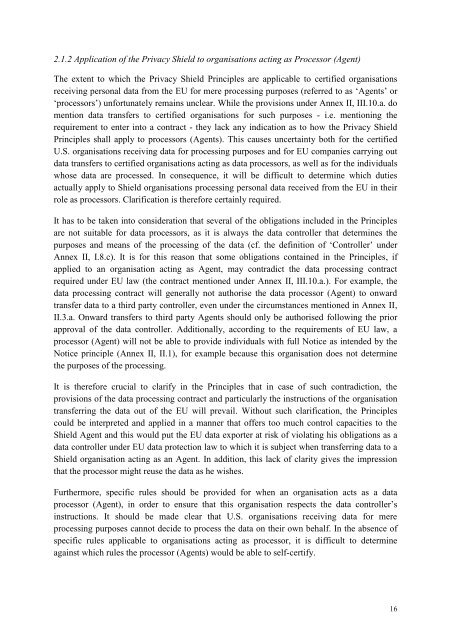ARTICLE 29 DATA PROTECTION WORKING PARTY
1SANK0H
1SANK0H
Create successful ePaper yourself
Turn your PDF publications into a flip-book with our unique Google optimized e-Paper software.
2.1.2 Application of the Privacy Shield to organisations acting as Processor (Agent)<br />
The extent to which the Privacy Shield Principles are applicable to certified organisations<br />
receiving personal data from the EU for mere processing purposes (referred to as ‘Agents’ or<br />
‘processors’) unfortunately remains unclear. While the provisions under Annex II, III.10.a. do<br />
mention data transfers to certified organisations for such purposes - i.e. mentioning the<br />
requirement to enter into a contract - they lack any indication as to how the Privacy Shield<br />
Principles shall apply to processors (Agents). This causes uncertainty both for the certified<br />
U.S. organisations receiving data for processing purposes and for EU companies carrying out<br />
data transfers to certified organisations acting as data processors, as well as for the individuals<br />
whose data are processed. In consequence, it will be difficult to determine which duties<br />
actually apply to Shield organisations processing personal data received from the EU in their<br />
role as processors. Clarification is therefore certainly required.<br />
It has to be taken into consideration that several of the obligations included in the Principles<br />
are not suitable for data processors, as it is always the data controller that determines the<br />
purposes and means of the processing of the data (cf. the definition of ‘Controller’ under<br />
Annex II, I.8.c). It is for this reason that some obligations contained in the Principles, if<br />
applied to an organisation acting as Agent, may contradict the data processing contract<br />
required under EU law (the contract mentioned under Annex II, III.10.a.). For example, the<br />
data processing contract will generally not authorise the data processor (Agent) to onward<br />
transfer data to a third party controller, even under the circumstances mentioned in Annex II,<br />
II.3.a. Onward transfers to third party Agents should only be authorised following the prior<br />
approval of the data controller. Additionally, according to the requirements of EU law, a<br />
processor (Agent) will not be able to provide individuals with full Notice as intended by the<br />
Notice principle (Annex II, II.1), for example because this organisation does not determine<br />
the purposes of the processing.<br />
It is therefore crucial to clarify in the Principles that in case of such contradiction, the<br />
provisions of the data processing contract and particularly the instructions of the organisation<br />
transferring the data out of the EU will prevail. Without such clarification, the Principles<br />
could be interpreted and applied in a manner that offers too much control capacities to the<br />
Shield Agent and this would put the EU data exporter at risk of violating his obligations as a<br />
data controller under EU data protection law to which it is subject when transferring data to a<br />
Shield organisation acting as an Agent. In addition, this lack of clarity gives the impression<br />
that the processor might reuse the data as he wishes.<br />
Furthermore, specific rules should be provided for when an organisation acts as a data<br />
processor (Agent), in order to ensure that this organisation respects the data controller’s<br />
instructions. It should be made clear that U.S. organisations receiving data for mere<br />
processing purposes cannot decide to process the data on their own behalf. In the absence of<br />
specific rules applicable to organisations acting as processor, it is difficult to determine<br />
against which rules the processor (Agents) would be able to self-certify.<br />
16


